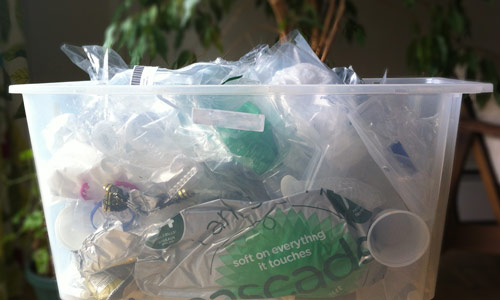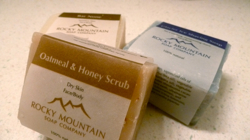
Before you start thinking I’m super gross and live in a pig sty, let me explain.
I’ve been keen on zero waste for a long time. I’m definitely a devoted recycler and composter, having grown up with both at home. But once I moved out I got to make my own choices about where my trash goes and how to keep it from showing up in the first place. Here’s my secret.
This is the most fun you’ll ever have recycling. There are tons of people at the depot. Assuming you pre-sorted your stuff into categories, once you’re there you just drop it into bins and have a chat with people. I usually pay a dollar to have three months’ worth of stuff recycled and the depot is a seven minute bike ride from home. Super convenient.
Continue reading I haven’t taken out the trash in six months »

You might expect a film about a Vancouver couple who spend a year almost zero-waste and without buying any stuff to be a tale of unimaginable hardship and sacrifice. Indeed, the prospects of using the same toothbrush for 365 days, not replacing worn-out clothing, or making crackers from scratch are daunting but The Clean Bin Project‘s Jen and Grant take a delighted, energetic approach akin to Alisa Smith and J.B. MacKinnon’s The 100-Mile Diet, but on the screen. The project was for them a competition for who could produce the least amount of garbage by year’s end (I won’t tell you who won), and involved learning about plastics, asking for their cheese unwrapped in their reusable container, and making the most of an old razor. Their enthusiasm was infectious. The 76-minute film is merely a glimpse at an entire year, but if it suggests anything about the 525,600 minutes they spent saving the planet, I think they enjoyed most of them.
Their artistically delicious film intersperses their own narrative of discovery — and occasional humourous disappointment — with the broader view of our consumption-based lifestyle and its consequences: successful community recycling initiatives; the Pacific Garbage Patch (which is twice the size of Texas); albatross death by plastic; landfills; and incomprehensibly large volumes of disposable stuff as depicted by Seattle artist Chris Jordan.
Continue reading Talking trash: Projecting Change Film Fest opens May 26, and plastic is a Texas-sized problem »

Photo by
Rakka via Flickr
Del Monte has officially gone bananas backwards by introducing individually-wrapped bananas — as if nature hadn’t already done the job. The bags, apparently containing a “Controlled Ripening Technology”, are supposed to extend the shelf life by up to six days.
James Harvey, Del Monte’s UK managing director, told the Fresh Produce Journal: “Del Monte’s new CRT packaging is designed to provide significant carbon footprint savings by reducing the frequency of deliveries and the amount of waste going to landfill. The packaging is also recyclable.” — Mail Online
Uhhh-huh. Funny, I wasn’t aware of this landfill burden that biodegradable bananas are causing. Hmm, wouldn’t it be cheaper and simpler to just buy what you need, solving both the “frequency of deliveries” and “amount of waste” problem and saving the money lost on wasted food and the cost of dealing with the plastic (landfill or otherwise) and avoiding this higher-priced packaged banana? Or, you know, storing your bananas properly and composting? Clearly Del Monte is out to make extra money under the guise of “food waste reduction” in a day and age when people are starting to be critical of excess packaging. (Notice Harvey said recyclable and not biodegradable?) Since when is the banana peel itself not good enough?
As my colleague said, if your bananas are getting too ripe, make some banana bread.
 This daily green blog challenge is in celebration of David Suzuki’s 75th birthday, supporting the David Suzuki Foundation. Please help me out by sponsoring me online now.
This daily green blog challenge is in celebration of David Suzuki’s 75th birthday, supporting the David Suzuki Foundation. Please help me out by sponsoring me online now.
Note: I am writing solely on my own behalf, and do not claim to represent the David Suzuki Foundation or its views here.

My bathroom shelf: Toothpaste, coconut oil, shea butter, oregano oil, floss and deodorant
Let’s face it: women use more products than men, and we have a recurring, generally very wasteful (but otherwise healthy) function that they don’t have. But this doesn’t mean we need to create more garbage than these low-maintenance dudes. If you live in Metro Vancouver, you’ve seen the ads, you’ve seen the news. We create a lot of garbage, and we can’t throw it on Cache Creek forever. Our rubbish has to go somewhere, so it’s time to try harder to avoid creating it in the first place. (It’s reduce, reuse, recycle, remember.) But you’re a girl, and you have needs. Now what?
Simple.
1. Get an “eco positive period“ with the Diva Cup and a combination of smart panties and reusable cloth liners and pads. The fabrics are organic cotton and the Diva Cup merely collects your flow, so you can avoid nasty things like toxic shock syndrome and yeast infections. Other benefits? No smelly waste, no crinkly noises from plastic pads, no discomfort, and no worries about running out. Yes, it can be discreet, super fun, and still feel sexy. It will simply make your life easier, save you money and time in the long run, and reduce your footprint on the planet big time. If you’re still not convinced, read their testimonials and their tips. Lunapads is based in Vancouver. Hint: sign up for their newsletter and grab the Green Zebra coupon book to save some dough.
 2. Happy soap! If you’re not into making your own, skip the shrinkwrap, the toxins and the plastic pumps with Rocky Mountain Soap Company‘s earth-friendly bar soap, wrapped in just a strip of paper. (Mountain Sky is another option.) They also sell a shaving* soap bar. I know you think you need foam to shave, but I dare you to try this stuff for a month and see the difference. I used to use bar soap that wasn’t even meant for shaving, then tried a foam cream in an aerosol can (what was I thinking?!). Rocky Mountain wins hands down. Their Vancouver store is on Granville & 15th, and they sell unscented soap too.
2. Happy soap! If you’re not into making your own, skip the shrinkwrap, the toxins and the plastic pumps with Rocky Mountain Soap Company‘s earth-friendly bar soap, wrapped in just a strip of paper. (Mountain Sky is another option.) They also sell a shaving* soap bar. I know you think you need foam to shave, but I dare you to try this stuff for a month and see the difference. I used to use bar soap that wasn’t even meant for shaving, then tried a foam cream in an aerosol can (what was I thinking?!). Rocky Mountain wins hands down. Their Vancouver store is on Granville & 15th, and they sell unscented soap too.
Continue reading 7 simple ways to reduce bathroom waste »



 Photo by
Photo by 

 2. Happy soap! If you’re not into making your own, skip the shrinkwrap, the
2. Happy soap! If you’re not into making your own, skip the shrinkwrap, the